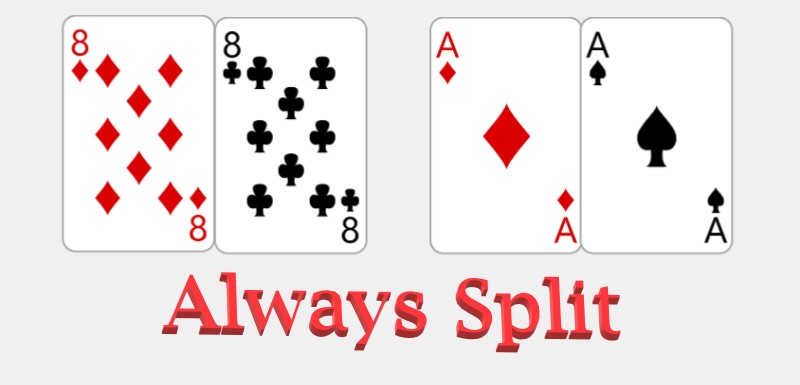Do You Always Split 8's In Blackjack
Only Split 2s and 3s if the dealer's card is 4-7 -Never Split 5s; either Double Down, or Hit if the dealer is showing a 10 or Ace.Split 6s and 7s if the dealers card is 6 or below.Always split 8s, no matter what. If you have a pair of 8s against a dealers 9 or 10, chances are you are going to lose whatever you do. However, on average you will lose less if you split. Vs a 9 stand: -0.54 hit: -0.506614 double: -1.01 split -0.39 vs a 10. Stand: -0.54 hit: -0.54 double: -1.07 split: -0.476849 in either case, splitting is still your best option. Meanwhile, if you split the 5s, you will be left with two hands that can easily become stiff (all 10s, all 9s, all 8s and all 7s will make a stiff hand). Also, the opportunity for those two hands to be doubled down will require another 5 or a 6 (for a total value of 10-11), and two 5s have already been drawn out of the deck. I've never split 8s when the dealer has a 10 or a face. Now the book says to split 8s against a 10. The software tells me I'm wrong if I don't split 8s against a 10. This chart says to split 8s against a 10. 'What do you think?' I told him I think the best play is to split 8s, no matter what the dealer has. In a game of Blackjack, opportunities to split will likely be rare. You have an approximate 0.5% chance of getting any pair from Aces to nines in your opening two cards, and a 9.4% probability of getting two cards valued at ten. When to split in Blackjack. It is arguably universally agreed that there are two scenarios in which you should always.
One of the best rules in blackjack is the 3 to 2 payout when you get an ace and a ten on your initial hand. This is called a “natural” or a “blackjack”. But you’ll find more casinos than everoffering games where the payout for this hand is only 6 to 5.
Here’s how that works:
In a normal blackjack game, you bet $100. You get a natural. Your payout is $150.

In a 6/5 blackjack, you bet $100. You get a natural. Your payout is only $120.
Casinos offer other rule changes that favor the player in exchange for the reduced payout, but these rules are never good enough to account for that lower payoff on a natural.
Here are some examples of those favorable rules:
- Single deck game
- Dealer stands on soft 17
- Player can double after splitting
- Player can double on any 2 cards
These rule changes do have an effect on the house edge. A single deck game has a house edge 0.61% better than a single deck game. The dealer standing on soft 17 instead of hitting has a houseedge of 0.2% better. Being able to double after splitting is good for almost 0.15%. Being able to double on any two cards is worth about 0.2%, too.
In fact, if you combine all the rules variations I listed, you’ll get a net gain of 1.2%, which is significant.
Here’s the problem, though:
6/5 blackjack gives the house an extra 1.35% edge.
And most casinos don’t give you ALL the good rules. They just give you enough good rules to convince you to try their 6/5 game.
Don’t do it. Even if you’re an excellent card counter, overcoming that extra 1.35% is tough.

Want to know how much that would actually cost you?
Assume an average 3/2 blackjack game offers the house an edge 1%. The 6/5 version has a house edge of 2.35%, instead.
Assume 60 hands per hour at $10 per hand. That’s $600 in action per hour.
You’ll lose, on average, $6 per hour playing the standard game.
Do You Always Split 8's In Blackjack Game
But if you play 6/5 instead, you’ll lose an average of $14.10 per hour.
Do You Always Split 8's In Blackjackin Blackjack
Just say no to 6/5 blackjack. If enough players refuse to play, the casinos might stop offering it.